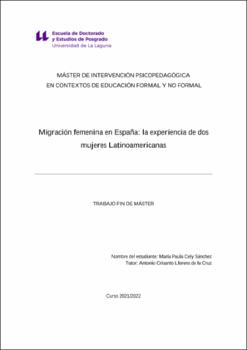Migración femenina en España: la experiencia de dos mujeres Latinoamericanas
Fecha
2022Resumen
La migración suele suponer un deseo marcado por un anhelo, un ideal donde se espera
conseguir y lograr aquello que se cree necesitar, por lo tanto, es un proceso complejo que
suele estar enmarcado en nostalgias, fantasías, retornos, reconstrucciones, fracasos,
emociones, etc. No solo es un reto a nivel personal, social y familiar, sino que también
constituye un desafío a nivel institucional y político, donde se ponen en juego políticas
de derechos humanos a la vez que se defiende lo nacional y la propia identidad cultural.
En el presente trabajo interesa comprender la complejidad y las múltiples aristas de la
migración femenina, y más allá de las cifras y de los números, que muestran el aumento
de la llegada de nuevos migrantes al viejo continente, se pretende dar una voz que permita
descubrir y ahondar sobre distintas experiencias migratorias de mujeres. En este caso, de
dos mujeres latinoamericanas, que por circunstancias completamente diferentes llegan a
España con deseos, ideales y anhelos particulares. Es desde allí, desde lo que ha vivido
cada una a lo largo del proceso migratorio, que interesa resaltar y comprender sus
singularidades, sus propias experiencias, su propia voz. El interés reside no solo en el
auge del fenómeno, sino también en la posibilidad de encontrar distintas formas de
abordarlo, de poder comprender las necesidades, las dificultades, las particularidades y
con esto, ampliar la visión de lo que significa y representa la experiencia, de lo que es ser
migrante siendo mujer.
Palabras clave: migración, mujer, Latinoamérica, España, estereotipos, adaptación. Migration usually involves a desire marked by a longing, an ideal where one hopes to
obtain and achieve what one believes one needs, therefore, it is a complex process that is
usually framed by nostalgia, fantasies, returns, reconstructions, failures, emotions, etc. It
is not only a challenge at a personal, social and family level, but also a challenge at an
institutional and political level, where human rights politics are at stake while defending
the national and cultural identity itself. In this research we are interested in understanding
the complexity and multiple aspects of female migration, and beyond the figures and
numbers, which show the increase in the arrival of new migrants to the old continent, we
intend to give a voice that allows us to discover and delve into the different migratory
experiences of women. In this case, of two Latin American women, who for completely
different circumstances arrive in Spain with particular desires, ideals and yearnings. It is
from there, from what each one has lived throughout the migratory process, that we are
interested in highlighting and understanding their singularities, their own experiences,
their own voice. The interest lies not only in the rise of the phenomenon, but also in the
possibility of finding different ways of approaching it, of being able to understand the
needs, the difficulties, the particularities and with this, to broaden the vision of what the
experience means and represents, of what it is to be a migrant being a woman.
Keywords: migration, women, Latin America, Spain, stereotypes, adaptation.





